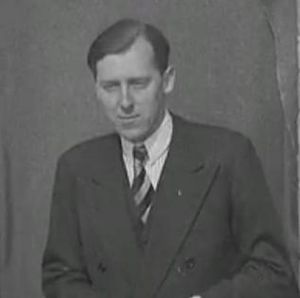Geoffrey Lloyd, Baron Geoffrey-Lloyd facts for kids
Quick facts for kids
The Lord Geoffrey-Lloyd
|
|
|---|---|
 |
|
| Minister of Education | |
| In office 17 September 1957 – 14 October 1959 |
|
| Monarch | Elizabeth II |
| Prime Minister | Harold Macmillan |
| Preceded by | The Viscount Hailsham |
| Succeeded by | Sir David Eccles |
| Personal details | |
| Born | 17 January 1902 |
| Died | 12 September 1984 (aged 82) |
| Alma mater | Trinity College, Cambridge |
Geoffrey William Geoffrey-Lloyd, Baron Geoffrey-Lloyd (born 17 January 1902 – died 12 September 1984), was an important British politician. He was a member of the Conservative Party and served in the government for many years. He was also a member of the Privy Council, a group of advisors to the King or Queen.
Contents
Early Life and Education
Geoffrey Lloyd was born in 1902. He was the oldest son of G. W. A. Lloyd from Newbury. He went to a famous school called Harrow School. After that, he studied at Trinity College, Cambridge, which is a part of Cambridge University. While he was there, he became the President of the Cambridge Union Society in 1925. This society is a well-known debating club.
Starting a Political Career
Geoffrey Lloyd first tried to become a Member of Parliament (MP) in 1924, but he didn't win. He tried again in 1929 for a different area called Birmingham Ladywood. He lost that election by only 11 votes, which was a very close result!
Before he became an MP, he worked as a Private Secretary. This means he helped important government officials. From 1926 to 1929, he was the Private Secretary to Sir Samuel Hoare, who was the Secretary of State for Air. Then, from 1929 to 1931, he worked for Stanley Baldwin. Baldwin was the Prime Minister at one point and later the Leader of the Opposition.
Becoming a Member of Parliament
In 1931, Geoffrey Lloyd was successfully elected as an MP for Birmingham Ladywood. He won by a large number of votes and kept this job until 1945. As an MP, he represented the people of his area in the UK Parliament.
He continued to work closely with Stanley Baldwin, serving as his Parliamentary Private Secretary from 1931 to 1935. This was when Baldwin was the Lord President of the Council and later when he was Prime Minister again.
Important Government Roles
Geoffrey Lloyd held many important jobs in the government. Here are some of them:
- Under-Secretary of State for the Home Department (1935–1939): This role involved helping with internal affairs of the country.
- Secretary for Mines (1939–1940): He was in charge of matters related to mining.
- Secretary for Petroleum (1940–1942): He handled issues related to oil.
- Minister of Information (1945): This was a key role during the end of World War II, dealing with public information.
In 1943, he was made a Privy Counsellor. This is a special honor given to senior politicians.
Later Political Life
After 1945, Geoffrey Lloyd worked as a Governor for the British Broadcasting Corporation (BBC) from 1946 to 1949. This meant he helped oversee the BBC.
He returned to Parliament in 1950 as the MP for Birmingham King's Norton. He held this seat until 1955. Then, he became the MP for Sutton Coldfield from 1955 until 1974.
During these years, he continued to serve in government:
- Minister of Fuel and Power (1951–1955): He was responsible for the country's energy supply.
- Minister of Education (1957–1959): In this role, he was in charge of education policies for the country.
Changing His Name and Becoming a Baron
On 18 April 1974, Geoffrey Lloyd officially changed his surname to Geoffrey-Lloyd. This was done through a legal process called a deed poll.
Soon after, on 6 May 1974, he was given a special title. He became a Baron Geoffrey-Lloyd, of Broomfield in the County of Kent. This meant he became a life peer, which allowed him to sit in the House of Lords (the upper house of the UK Parliament) for the rest of his life.
Personal Life and Death
Lord Geoffrey-Lloyd lived to be 82 years old. He passed away in Kent on 12 September 1984.
 | Aurelia Browder |
 | Nannie Helen Burroughs |
 | Michelle Alexander |

